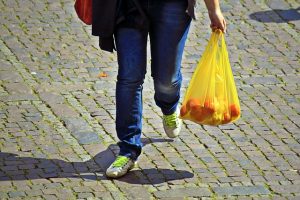by Jess Deleconio, McCormack Graduate School student
 I hoard plastic bags. Just like my mother, her mother, and many family members before me, I have a bag filled with plastic bags in my kitchen. Growing up, I thought saving and reusing plastic bags was normal behavior, but according to the EPA, only about two percent of plastic bags are recycled or reused in the United States. This means that the majority of plastic bags do not end up in someone’s kitchen, but in a landfill or wreaking havoc on the environment. In March 2015, with the goal of protecting the environment and reducing waste, the Cambridge City Council voted to approve the Bring Your Own Bag (“BYOB”) ordinance which went into effect a year later. Since then, retailers throughout the city have been required to charge customers at least ten cents per single-use checkout bag. The ordinance also bans single-use plastic bags; retailers in Cambridge have a choice of offering either paper, biodegradable, or reusable bags to customers. BYOB was created to encourage people to use reusable bags in order to decrease their consumption of plastics.
I hoard plastic bags. Just like my mother, her mother, and many family members before me, I have a bag filled with plastic bags in my kitchen. Growing up, I thought saving and reusing plastic bags was normal behavior, but according to the EPA, only about two percent of plastic bags are recycled or reused in the United States. This means that the majority of plastic bags do not end up in someone’s kitchen, but in a landfill or wreaking havoc on the environment. In March 2015, with the goal of protecting the environment and reducing waste, the Cambridge City Council voted to approve the Bring Your Own Bag (“BYOB”) ordinance which went into effect a year later. Since then, retailers throughout the city have been required to charge customers at least ten cents per single-use checkout bag. The ordinance also bans single-use plastic bags; retailers in Cambridge have a choice of offering either paper, biodegradable, or reusable bags to customers. BYOB was created to encourage people to use reusable bags in order to decrease their consumption of plastics.
Cambridge is not alone in their effort to curtail plastic bag use. Now, over 40 municipalities in Massachusetts have some sort of legislation related to regulating single-use plastic checkout bags, and user fees – a fee charged by a government on a per-use basis for a good or service – are often a part of the legislation. In the case of Cambridge, the user fee is 10 cents per bag needed at a point-of-sale. These fees can be an effective means for policymakers to change the behavior of constituents.
User fees have both benefits and drawbacks. They can be seen as a benefit to a municipality because the marginal social benefit is better matched to the marginal social cost. This means that when user fees are utilized, only those who wish to take advantage of a particular good or service are charged. People who use their own bags while shopping in Cambridge benefit from not having to pay the BYOB tax, while the burden of the tax is placed on those that do need a bag.
The downside to user fees is that they can be seen as regressive, meaning that they disproportionately have a negative impact on individuals with lower incomes. If all individuals within a given community are charged the same flat fee for a good or service, then the user fee will take up a bigger percentage of a low-income person’s paycheck versus a person who is more affluent. In the case of the BYOB ordinance, the user fee is not mandatory; it can be easily avoided by reusing bags, therefore reducing the unfair strain on low-income individuals.
On a personal level, the BYOB ordinance has changed my behavior. I now keep a reusable bag in my purse for when I go shopping not only in Cambridge, but in Boston too. Ten cents may seem like a small amount of money, but using three reusable bags for groceries each week alone saves me $15.60 per year, and I am reducing my carbon footprint. Although my plastic bag stash has decreased, I know it is for a good reason. If more municipalities adopt similar legislation, then more people may change their behavior and we will all reap the benefits.
Jess Deleconio is a first-year student at UMass Boston’s John W. McCormack Graduate School of Policy and Global Studies studying public administration. She is a project coordinator for the Massachusetts School Building Authority and a Cambridge resident.

March 1, 2017 at 5:46 pm
my family does this too! when I moved into my first apartment, I didn’t even realize I was in the habit until my entire cabinet was filled with plastic bags.
March 1, 2017 at 6:35 pm
well put! thanks, jess!
March 23, 2017 at 9:22 am
We can buy a different type of designer reusable bag at a cheap price.
I really love this bag
July 1, 2017 at 9:24 am
As a plastics company, we take care to use recycled plastics and bio plastics.
Thanks for sharing this research!
Osman Yasar
Istanbul/ TURKEY
http://www.karbayambalaj.com